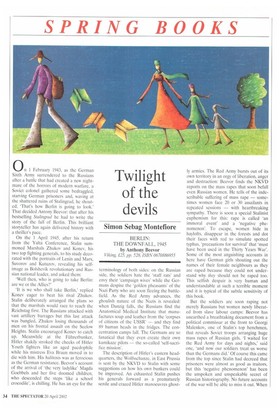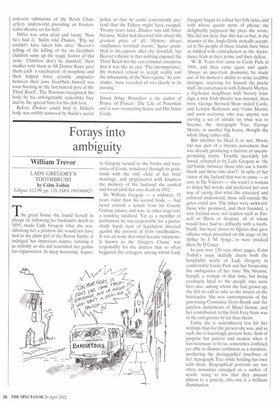Twilight of the devils
Simon Sebag Montefiore
BERLIN: THE DOWNFALL, 1945 by Anthony Beevor Viking, £25, pp. 528, ISBN 0670886955 n 1 February 1943, as the German Sixth Army surrendered to the Russians after a battle that had created a new nightmare of the horrors of modern warfare, a Soviet colonel gathered some bedraggled, starving German prisoners and, waving at the shattered ruins of Stalingrad, he shouted, 'That's how Berlin is going to look.' That decided Antony Beevor: that after his bestselling Stalingrad he had to write the story of the fall of Berlin. This brilliant storyteller has again delivered history with a thriller's pace.
On the 1 April 1945. after his return from the Yalta Conference, Stalin summoned Marshals Zhukov and Konev, his two top fighting generals, to his study decorated with the portraits of Lenin and Marx, Suvorov and Kutuzov, revealing his selfimage as Bolshevik revolutionary and Russian national leader, and asked them: 'Well then, who is going to take Berlin: are we or the Allies?'
'It is we who shall take Berlin,' replied Konev eager to beat his rival Zhukov. Stalin deliberately arranged the plans so that the marshals would race to reach the Reichstag first. The Russians attacked with vast artillery barrages but this last attack was bungled, Zhukov losing thousands of men on his frontal assault on the Seelow Heights. Stalin encouraged Konev to catch up. Meanwhile at the Fahrerbunker, Hitler shakily stroked the cheeks of Hitler Youth fighters like an aged paedophile while his mistress Eva Braun moved in to die with him. His halitosis was as ferocious as the German resistance. Beevor's account of the arrival of 'the very ladylike' Magda Goebbels and her five doomed children, who descended the steps 'like a school crocodile', is chilling. He has an eye for the terminology of both sides: on the Russian side, the soldiers hate the 'staff rats' and envy their 'campaign wives' while the Germans despise the 'golden pheasants' of the Nazi Party who are soon fleeing the battlefield. As the Red Army advances, the ghoulish nature of the Nazis is revealed: when Danzig falls, the Russians find the Anatomical Medical Institute that manufactures soap and leather from the 'corpses of citizens of the USSR' — and they find 89 human heads in the fridges. The concentration camps fall. The Germans are so fanatical that they even create their own kamikaze pilots — the so-called 'self-sacrifice mission'.
The description of Hitler's eastern headquarters, the Wolfsschanze, in East Prussia is sent by the NKVD to Stalin with some suggestions on how his own bunkers could be improved. An exhausted Stalin pushes his generals forward as a prematurely senile arid crazed Hitler manoeuvres ghost ly armies. The Red Army bursts out of its own territory in an orgy of liberation, anger and destruction: Beevor finds the NKVD reports on the mass rapes that soon befall even Russian women. He tells of the indescribable suffering of mass rape — sometimes women face 20 or 30 assailants in repeated sessions — with heartbreaking sympathy. There is soon a special Stalinist euphemism for this: rape is called 'an immoral event' and a 'negative phenomenon'. To escape, women hide in haylofts, disappear in the forests and dot their faces with red to simulate spotted typhus, 'precautions for survival' that 'must have been used in the Thirty Years War'. Some of the most anguishing accounts in here have German girls shouting out the names of their female neighbours as they are raped because they could not understand why they should not be raped too. This selfish despair is very human and understandable at such a terrible moment and it is typical of the subtle sensitivity of this book.
But the soldiers are soon raping not merely Russians but women newly liberated from slave labour camps: Beevor has unearthed a breathtaking document from a political commissar at the front to Georgi Malenkov, one of Stalin's top henchmen, that reveals Soviet troops arranging huge mass rapes of Russian girls. 'I waited for the Red Army for days and nights,' said one, 'and now our soldiers treat us worse than the Germans did.' Of course this came from the top since Stalin had decreed that prisoners were almost as good as traitors, but this 'negative phenomenon' has been the unspoken and unspeakable secret of Russian historiography. No future accounts of the war will be able to miss it out. When
he reveals that Soviet troops raped their own women as well as German, he shatters one of the myths of Soviet history. No wonder the Russian ambassador has complained about this most inconvenient reality even half a century later — it is still dynamite.
Both Stalingrad and Berlin are battles that have been subjects of a legion books — the events of Hitler's death, for example, are familiar to us in every detail — but many accounts are heartless compendiums of army groups, tanks and clashes that lack the depth of the human experience. This is what Beevor brought to his Stalingrad: the humanity. There we sympathised as much with the German invaders, eating their rats and cats, as we did with our gallant Soviet allies. The military story of the supreme commanders and the NCOs is told as well as those of the ordinary soldiers and the secret policemen — on both sides. In his superb Berlin, Beevor gives us the blood, the death, the fear, the savagery, the moral dilemmas, the massacres, the unforgettably harrowing account of the mass rapes, Hitler, Stalin, Goebbels and Zhukov, Beria and Bormann, the dramas of the Gotterdammerung that was Berlin in April 1945 —but he makes us feel the chaos and the fear as if every drop of blood was our own: that is his gift. It is much more than just a humane account of Berlin; it is compellingly readable, deeply researched, and beautifully written telling of the one of the seminal moral events of our time.
Like Stalingrad, Beevor's original research and his labours of synthesis are huge. He has trawled newly opened archives, interviewed new witnesses, used the vivid notes of the great Soviet novelist Vasily Grossman, and discovered fascinating things: he finds new evidence that gives another reason why Stalin was so keen to get to Berlin: he wanted the uranium of the Kaiser Wilhelm Institute at Dahlem, Germany's nuclear laboratories, well before Truman revealed the power of the Bomb to him at Potsdam.
As the Russians fought their way towards the Chancellery, Hitler dictated his last testament and then married Eva Braun. While the wedding parties primly sipped champagne and nibbled cakes, Hitler's secretary went upstairs at 4 a. m. on the 29 April 1945 to find some food for the Goebbels children. There she encountered scenes of frantic depravity on the upper floors of the bunker that shocked her — and demonstrate Beevor's eye for the wicked and the fascinating:
An erotic fever seemed to have taken possession of everybody, Everywhere, even on the dentist's chair, I saw bodies in lascivious embraces. The women had discarded all modesty and were freely exposing their private parts.
The SS had been tempting hungry girls into the bunker with promises of parties and food. As Beevor writes, 'It was the apocalypse of totalitarian corruption, with the concrete submarine of the Reich Chancellery underworld providing an Existentialist theatre set for hell.'
Hitler was soon dead and burnt. 'Now he's had it,' Stalin told Zhukov. 'Pity we couldn't have taken him alive.' Beevor's telling of the killing of the six Goebbels children sums up the tragic horror of this story: 'Children, don't be alarmed,' their mother told them as SS Doctor Kunz gave them each 'a vaccination' of morphine and then helped force cyanide ampoules between their jaws. Goebbels himself was soon burning in 'the last funeral pyre of the Third Reich'. The Russians recognised the body by his unforgettably rodentlike face and by the special boot for his club foot.
Before Zhukov could find it, Hitler's body was swiftly removed by Stalin's secret police so that he could conveniently pretend that the Fiihrer might have escaped. Twenty years later, Zhukov was still bitter because Stalin had deceived him about the greatest prize of all. 'History always emphasises terminal events, Speer grumbled to his captors after the downfall, but Beevor's theme is that nothing exposed the Third Reich for the vast criminal enterprise that it was like its end: The incompetence, the frenzied refusal to accept reality and the inhumanity of the Nazi regime,' he concludes, 'were revealed all too clearly in its passing.'
Simon Sebag Montefiore is the author of Prince of Princes: The Life of Potemkin and is now researching Stalin and His Inner Circle.








































































 Previous page
Previous page